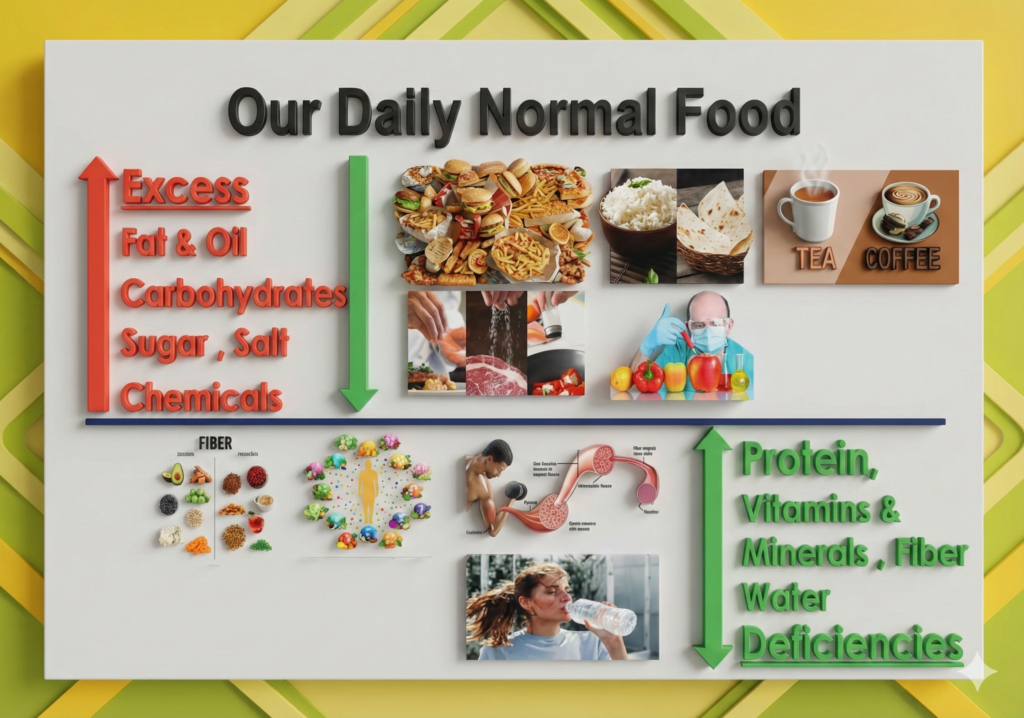"Elevate Your Well-Being: Nourishing Your Body, Empowering Your Life through Optimal Nutrition"
Nutrition refers to the intake of food and nutrients by the body, essential for growth, development, and maintaining overall health.
The need for proper nutrition is fundamental for several reasons:
Energy Source: Nutrition provides the necessary calories to fuel the body’s activities. Carbohydrates, fats, and proteins are primary sources of energy.
Body Functionality: Nutrients such as vitamins and minerals play crucial roles in supporting various physiological functions, including immune response, metabolism, and the maintenance of healthy organs.
Growth and Development: Adequate nutrition is vital during periods of growth, such as childhood, adolescence, and pregnancy. Nutrients like protein, calcium, and iron are particularly important for development.
Disease Prevention: A well-balanced diet with essential nutrients helps prevent various health conditions, including deficiencies, heart disease, diabetes, and certain cancers.
Optimal Organ Function: Each organ in the body requires specific nutrients to function optimally. For example, calcium is essential for bone health, and omega-3 fatty acids support brain function.
Weight Management: Proper nutrition, combined with regular physical activity, is crucial for maintaining a healthy weight and preventing obesity-related conditions.
Cognitive Function: Nutrients impact brain health and cognitive function. Omega-3 fatty acids, antioxidants, and certain vitamins support memory, concentration, and overall mental well-being.
Recovery and Healing: After illness, injury, or surgery, the body requires additional nutrients for recovery and healing. Protein, vitamins, and minerals play vital roles in this process.
Hormonal Balance: Nutrients contribute to the production and regulation of hormones, which influence various bodily functions, including metabolism, mood, and reproductive health.
Cellular Maintenance: The body constantly undergoes cellular turnover and repair. Adequate nutrition provides the building blocks necessary for cell maintenance and renewal.
Meeting nutritional needs involves consuming a diverse range of foods, including fruits, vegetables, whole grains, lean proteins, and healthy fats. A balanced diet ensures the intake of essential nutrients, promoting overall health and well-being throughout the lifespan.
Functions &
Sources

Nutrients play crucial roles in maintaining various physiological functions within the body. These functions contribute to overall health, growth, development, and disease prevention. Here are the primary functions of key nutrients:
| Nutrient | Function | Common Food Sources |
|---|---|---|
| Carbohydrates | Primary energy source for the body | Whole grains, fruits, vegetables |
| Proteins | Tissue repair and growth; Enzyme production | Meat, fish, dairy, legumes, nuts |
| Fats | Energy storage; Cellular structure | Olive oil, avocados, nuts, fatty fish |
| Vitamins | Regulatory functions; Antioxidant protection | Fruits, vegetables, dairy, meat |
| Minerals | Bone health; Electrolyte balance | Dairy, leafy greens, nuts, seafood |
| Water | Hydration; Essential for bodily functions | Water, fruits, vegetables |
| Iron | Oxygen transport in red blood cells | Red meat, beans, lentils, spinach |
| Iodine | Essential for thyroid hormone production | Iodized salt, seafood, dairy |
| Zinc | Immune function; Wound healing | Meat, dairy, nuts, legumes |
| Vitamin D | Calcium absorption for bone health | Fatty fish, fortified dairy products |
| Vitamin K | Blood clotting | Leafy greens, broccoli, soybeans |
| Folate (B9) | Cell division and DNA synthesis | Leafy greens, legumes, fortified cereals |
Remember that this table provides a general overview, and individual nutritional needs may vary.
Vitamins

Vitamins are essential organic compounds that the body requires in small amounts to maintain various physiological functions and promote overall health. They play crucial roles in metabolism, immune function, tissue repair, and other biochemical processes.
| Vitamin | Function | Common Food Sources |
|---|---|---|
| Vitamin A | Supports vision, immune function, and skin health | Carrots, sweet potatoes, spinach, mangoes, liver |
| Vitamin B1 (Thiamine) | Converts food into energy, supports nerve function | Whole grains, pork, legumes |
| Vitamin B2 (Riboflavin) | Energy production, antioxidant support | Dairy products, lean meats, green leafy vegetables |
| Vitamin B3 (Niacin) | Supports energy metabolism, DNA repair | Meat, fish, nuts, whole grains |
| Vitamin B6 (Pyridoxine) | Aids in protein metabolism, supports brain development | Chicken, fish, bananas, potatoes |
| Vitamin B12 (Cobalamin) | Vital for nerve function, DNA synthesis | Meat, fish, dairy, fortified foods |
| Vitamin C (Ascorbic Acid) | Antioxidant, immune support, collagen synthesis | Citrus fruits (oranges, lemons), strawberries, bell peppers |
| Vitamin D | Facilitates calcium absorption, essential for bone health | Fatty fish (salmon, mackerel), fortified dairy products, sunlight exposure |
| Vitamin E | Antioxidant, protects cell membranes, supports skin health | Nuts, seeds, vegetable oils, spinach |
| Vitamin K | Essential for blood clotting and bone metabolism | Leafy greens (kale, spinach), broccoli, Brussels sprouts |
Remember that this table provides a general overview, and individual nutritional needs may vary.
Minerals

Minerals are inorganic elements that play crucial roles in various physiological functions within the human body. Unlike vitamins, minerals are not composed of carbon and are obtained through the diet, either directly from food sources or, in some cases, from supplements.
| Mineral | Function | Common Food Sources |
|---|---|---|
| Calcium | Essential for bone and teeth formation; supports muscle function and nerve transmission | Dairy products, leafy greens, fortified plant-based milk |
| Phosphorus | Structural component of bones and teeth; vital for energy metabolism | Meat, dairy products, nuts, seeds |
| Magnesium | Supports muscle and nerve function; important for bone health | Nuts, seeds, whole grains, leafy greens |
| Potassium | Electrolyte balance; supports heart and muscle function | Bananas, oranges, potatoes, leafy greens |
| Sodium | Maintains fluid balance; supports nerve and muscle function | Table salt, processed foods, seafood |
| Iron | Oxygen transport in red blood cells; part of hemoglobin | Red meat, beans, lentils, spinach |
| Zinc | Supports immune function; involved in wound healing | Meat, dairy, nuts, legumes |
| Copper | Necessary for the formation of red blood cells; supports connective tissues | Seafood, nuts, seeds, whole grains |
| Selenium | Acts as an antioxidant; supports thyroid function | Seafood, meat, Brazil nuts, whole grains |
| Iodine | Essential for thyroid hormone production | Iodized salt, seafood, dairy |
| Chromium | Aids in glucose metabolism | Broccoli, whole grains, nuts |
| Manganese | Supports bone formation and metabolism of amino acids and carbohydrates | Nuts, seeds, whole grains, leafy greens |
It’s important to note that this table provides a general overview, and individual nutritional needs may vary.
"Your health is an investment, not an expense. Shift your food habits, and watch your well-being flourish."


